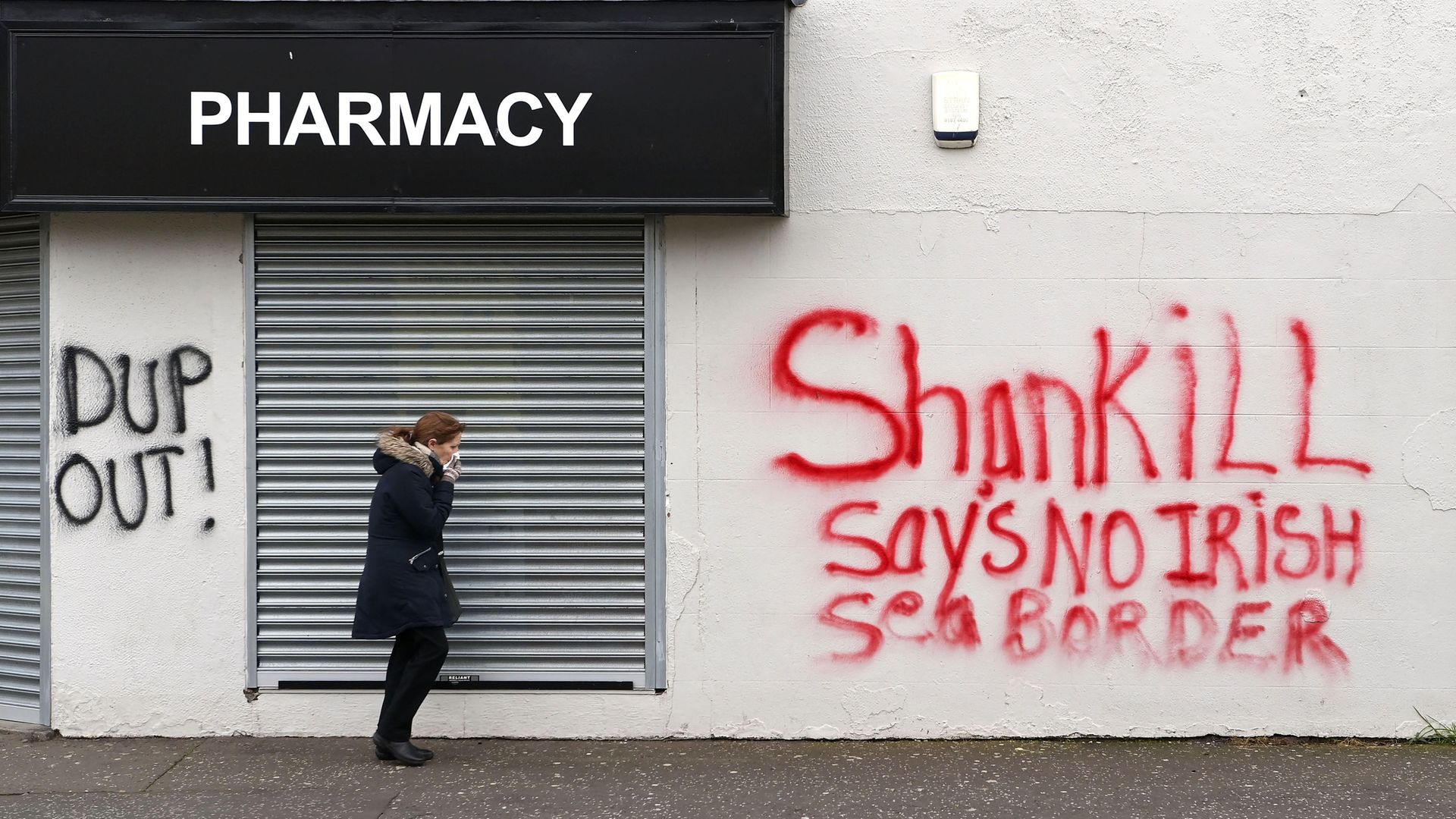
The unravelling of the deal over Northern Ireland exposes an unresolved issue at the heart of Brexit that is no closer to being resolved now than it was four years ago. STEVE RICHARDS reports.
What is the future for Northern Ireland in the context of Brexit? If the question were posed in an A-level examination the British govn would be on its fourth or fifth retake.
Both Boris Johnson and Theresa May have made several attempts to come up with an answer. Indeed Johnson’s most recent effort proves the Brexit deal that he hailed with an exaggerated flourish on Christmas Eve is not remotely oven ready. The growing crisis in Northern Ireland is the most urgently vivid example of a deal unravelling.
The television pictures showing empty shelves in Northern Ireland stores and the interviews with distraught traders buried in layers of complex form-filling convey accessibly the chaos to a wide audience. Yet the most revealing manifestation of the emergency is that Johnson and Michael Gove seek to disown elements of the Northern Ireland Protocol that they hailed as a triumph of expediency only a few weeks ago.
Another dark Brexit pattern forms. In October 2019 Johnson portrayed his Withdrawal Agreement as an epic success. A year later when the agreement presented him with problems in relation to Northern Ireland he threatened to break international law. Now the gap between taking a bow over a negotiation and running away from its implications narrows to a few weeks.
Each time there is a tactical sleight. In justifying the threat to break the law Johnson argued the sanctions were only necessary because the EU were making outrageous threats in relation to the border between Britain and Northern Ireland. In reality the threats were the inevitable consequence of the Withdrawal Agreement Johnson negotiated, a much worse outcome than the agreement reached by Theresa May.
Now Johnson and Gove relate the latest furore to the vaccine drama and the foolish, panic stricken threat of the European Commission to trigger Article 16 of the protocol. Given that Johnson has also threatened to trigger the emergency provision these displays of neurotic machismo on both sides are examples of the Protocol’s extreme fragility. They are also a red herring.
The bureaucracy that is causing chaos at the border between Northern Ireland and the rest of the UK is a direct and unavoidable consequence of Johnson’s decision to opt for a hard Brexit. When he told business leaders in Northern Ireland that there would be no additional form-filling he was either lying or had failed to understand the implications of his own objectives.
There are many ironies. The DUP leadership that supported Brexit is up in arms insisting rightly that the Protocol is “unstable” and that the crisis goes well beyond “teething problems”. This is the same leadership that opposed Theresa May’s deal, one that for all its flaws would have avoided this crisis. Meanwhile the British government has lost the sovereign right to trade within its own borders without checks in the cause of “sovereignty”.
With mind bogging chutzpah there are reports that Johnson might support a plan to move the checks to a border between Northern Ireland and Ireland, the proposition that he explicitly rejected when he became prime minister.
Shortly after David Cameron announced the Brexit referendum I had breakfast with the then German ambassador in London. He observed that the UK was the least suited of EU members to attempt an exit because of the “Irish Question”. The UK was the only EU country where part of a land mass would be out of the EU and the other part would still be a member. Given that few were reflecting on this issue I was grateful for an insight that was both obvious and yet overlooked at the time.
The Irish Question, as it has been described, is an issue that shines a light on the entire Brexit saga. When the architects of the Good Friday Agreement, John Major and Tony Blair, visited Belfast during the 2016 campaign their concerns about the threat to peace in Northern Ireland barely registered. The indifference in much of the media and beyond had a wider lesson.
Referendums are hopeless devices for resolving issues in an informed way. As part of a reasoned campaign the warnings of two former prime ministers would have topped mendacious slogans on buses. The warnings of Major and Blair were unheard.
One of those not listening was Theresa May. In a recent explosively illuminating interview for ‘UK in a Changing Europe’ the former chancellor Phillip Hammond noted that the question of Ireland came as a surprise for the new prime minister: “The Northern Ireland problem hadn’t really become front and centre in her mind, or indeed anybody’s mind, at this point. The big change in Theresa’s attitude to Brexit came when she understood – and it was like a light bulb going on – when she understood that the problems over Northern Ireland would inevitably lead to the break-up of the United Kingdom if we were not able to secure an arrangement with the European Union that allowed us, effectively, to able to access the single market. Once she understood that, Theresa then became a fanatical devotee of an ambitious deal with the European Union.”
May began the Brexit sequence not even aware of the deeper issues. Her attempt to address the “light bulb moment” highlights another motif of the Brexit saga, the use of terms that sound precise but are dangerously vague.
May sought to resolve the issue by declaring that ‘technology’ would avoid the need for a hard bolder between Northern Ireland and Ireland. The Brexiteers leapt in. Johnson suggested at one point that the equivalent of the Oyster cad used for travelling around London would do the trick. Unsurprisingly no one has discovered the ‘technology’ to police a vast porous border effectively. Such distorting terms are ubiquitous in British politics at the moment. Another is ‘sovereignty’, a pure version of which is impossible to define let alone achieve.
May’s ultimate solution was to remain in the customs union while the search for a “technological solution” continued, a big concession from the EU. Johnson and others needed to portray this move as a terrible defeat. In doing so they removed May but negotiated a deal that is the cause of their current problems.
Some commentators, not only ardent Brexiteers, loftily suggest that none of this matters very much. They argue most voters are not bothered with what happens in Northern Ireland and anyone focussing on Brexit related issues should move on. Such comments are misplaced on many fronts. Most fundamentally of all they are the type of lazy response to ongoing crises that have applied in darker contexts to the one we are living through. “There is nothing we can do about it so let us ignore what is happening” is an attitude that can have dangerous consequences.
Even if such complacency were desirable it is not feasible. The future of the UK is surfacing as one of the biggest post-Brexit stories and cannot be brushed aside. More widely, the deal negotiated by David ‘Frostie’ Frost was only agreed speedily because so many of the thorny issues were kicked into the long grass. Negotiations over fishing will resume in the build up to the next general election. If Johnson seeks to exert ‘sovereignty’ there are mechanisms for the EU to respond and ‘Frostie’ or his equivalent will be back in the negotiating room.
As for the Irish Question there are only two answers if the UK remains outside the EU. The first is the one May eventually recognised, with the UK being part of the customs union. The other is a united Ireland.
Given that both options are politically impossible for the current government to accept there will be much huffing and puffing in an attempt to revise the Protocol. The government will blame the EU for the consequences of a deal it negotiated.The huffs and puffs will not answer the Irish Question. There will be many more re-sits of the exam question. Still Brexit will be far from done.
Steve Richards’ one man show, Rock N Roll Politics, is streaming live on February 17. Tickets are available on the Kings Place website. His latest book is The Prime Ministers-Reflections on Leadership
What do you think? Have your say on this and more by emailing letters@theneweuropean.co.uk










